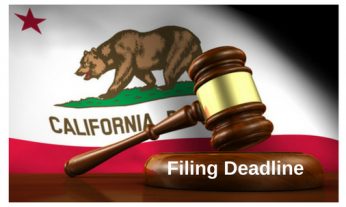 What is the filing deadline to sue an employer in California? Reginald Mitchell worked as a health facilities investigator for the California Department of Public Health until 2011. After he resigned, he filed a complaint with the Equal Employment Opportunity Commission (EEOC). The complaint alleging that he had been subjected to racial discrimination. A copy of his EEOC complaint was also filed with the California Department of Fair Employment and Housing (DFEH), which issued him a right-to-sue notice.
What is the filing deadline to sue an employer in California? Reginald Mitchell worked as a health facilities investigator for the California Department of Public Health until 2011. After he resigned, he filed a complaint with the Equal Employment Opportunity Commission (EEOC). The complaint alleging that he had been subjected to racial discrimination. A copy of his EEOC complaint was also filed with the California Department of Fair Employment and Housing (DFEH), which issued him a right-to-sue notice.
The right-to-sue notice stated that he could bring a civil action against his employer within one year from the date of the letter – September 9, 2011. It also stated that the one-year period would be tolled during the time that the EEOC investigated his complaint.
On September 30, 2013, the EEOC found that there was reasonable cause to believe that Mitchell had been the victim of discrimination. A right-to-sue notice was later issued by the U.S. Department of Justice. Mitchell received the notice on March 21, 2014.
Mitchell then filed a civil action under the California Fair Employment and Housing Act (FEHA) on July 8, 2014. This was 107 days after he received his federal right-to-sue letter. The federal right-to-sue period lasts only 90 days.
Was Mitchell still eligible to file that action? On one hand, his federal filing deadline had expired. But on the other hand, he had been informed by the state of California that he had a year to bring a suit against his employer – and that this time period would be tolled while the EEOC was investigating. And when Mitchell filed his complaint, far less than a year had passed since the conclusion of the EEOC’s investigation.
Can the Filing Deadline Be Extended?
The case of Mitchell v. California Department of Public Health revolved around whether an employee in Mitchell’s situation can file a complaint after the federal right-to-sue period has ended. A California appeals court provided an answer that will please plaintiffs in employment discrimination cases – but not employers.
The court ruled that FEHA’s one-year filing deadline limitation period was tolled while the EEOC investigated, and thus Mitchell’s complaint was timely. The ruling points out that, according to Section 12965 of California’s Government Code, the limitation period can be tolled when the following three factors are met:
- Concurrent charges filed with the EEOC and DFEH
- The DFEH defers investigation of the charges to the EEOC, and
- Charges are deferred to the EEOC and right-to-sue notice issued by DFEH.
The court held that all three of these factors were met in Mitchell’s case. According to the ruling, even though the federal right-to-sue period had expired, the equitable tolling meant that Mitchell’s right to take action under FEHA was still valid on the day he filed his complaint.
The court’s opinion argues that equitable tolling of the FEHA limitation period is in the public interest. It points out that, with equitable tolling, the defendant will receive notice of the claim, and the plaintiff will not have to pursue simultaneous actions based on the same set of facts. It also notes that equitable tolling prevents the costs of duplicate proceedings.
If You Have Any Questions
The employment and labor law attorneys at Beck Law P.C. have years of experience in EEOC and FEHA cases. If you would like to set up a consultation, you can call or email our Santa Rosa office today.
BECK LAW P.C. – SANTA ROSA – PETALUMA – UKIAH – LAKE COUNTY
